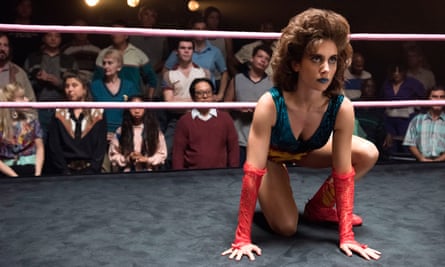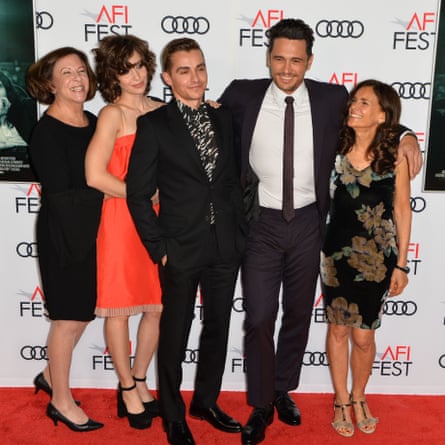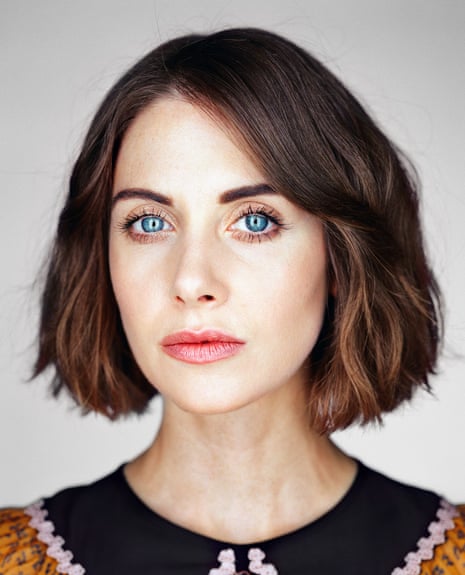‘Hello, it’s Ali!’ comes a text message from an unknown number. “I’m running late but I’ll see you soon!” Los Angeles born actor Alison Brie’s Twitter bio reads “Always late… but worth the wait.” It’s true – both when we meet and in terms of her acting career. Though 34-year-old Brie feels like she’s been playing catch-up her entire career, she’s now a Golden Globe- nominated actor – for her role as a female wrestler in Glow – has a starring role in James Franco’s The Disaster Artist and will soon appear in Spielberg’s new drama The Post.
As a kid she knew she was going to be an actor. Growing up in Pasadena, she wasn’t part of the central Hollywood set – “Although the girl who played the daughter in Beethoven did go to my high school.” She would act in local theatre shows, but decided against going to one of LA’s prestigious performing arts high schools, opting instead for a normal teenage experience with her friends.
“I told my mom recently,” she says, “that I thought it was cool she didn’t make me become a child actor. She said: ‘Well we tried…’ I had such integrity at a young age.”
Brie went on to study acting at CalArts in LA. The first time she left home was to do a year exchange in Glasgow – still the farthest from home that she’s ever travelled. “It was never sunny,” she recalls. “This whole morose side I never knew I had was able to come out. Chips and cheese was a real thing for me. I only ate that at one in the morning and I’d forget. If you don’t remember, the calories don’t count.”
The “industry” was of no interest until she had her resolved her education. In college her roommate’s friend Rachel Bilson starred in The OC and Brie baulked at the idea. “I remember saying: ‘Well I don’t know if I would even work in TV.’ I was so snobby.”

The years spent honing her craft meant that Brie escaped being typecast and running before she could walk. “I knew who I was before thrusting myself into this world where everyone is judging you and you’re constantly being objectified,” she says.
Comedy was a happy accident. In college she was convinced she’d become the “ingenue”. “Then I’d go out to audition for dramas as ‘the girl who dies’! or ‘the guy who dies’ girlfriend’! and I couldn’t get those parts to save my life because the material was so uninspiring.”
Her first big gig was Mad Men. Straight out of college, Brie scored the comedic dramatic role of Trudy – wife of Pete – Campbell. Her mature presentation on that show was confusing at other auditions because it was presumed she was a lot older than 24. “I was playing a wife. For a while I started auditioning for ‘wives and mothers’ and I’d be sitting in a room with people who were 40.”
Then came NBC’s Community, where she played the overachieving Annie and learned how to be funny on the job – “just from fucking around with everyone between takes”, she says. Juggling that and Mad Men at a point where TV streaming was booming was a “dream” for Brie. “Oh it was just fun and awesome,” she says. On Mad Men she was “silent and professional”. On Community she was “jumping around making fart jokes”.

The character of Trudy still holds a place in Brie’s heart. “I lovvvved Trudy,” she smiles. “Matt Weiner was fantastic at writing these complex characters for women in an era where they were trapped in stereotypical roles, but could wield power. They made men think that they had the power while secretly controlling everything. Trudy was such a badass.”
With so much of Mad Men focused on sexism, the themes seem relevant again in the post-Weinstein climate of Hollywood. “It’s triggering,” says Brie of the constant news cycle. “It made me think about my experiences, cataloguing encounters over the years, going: ‘Yeah that was inappropriate…’ It’s a strange time, but it’s exciting. I feel very moved by the courage of these women. I hope it’s going to influence great change. It’s like cleaning your room: you have to make a big mess before it becomes clean. We’re in a real big, dark mess. Hopefully we’ll achieve some sort of clarity.”
When Mad Men and Community ended around the same time, Brie tried to focus on film. Television dragged her back. “I’ve learned that I’m at home on TV. I’m a person of routine. I eat the same thing every day. I start with my white loose-leaf tea, I take my apple with my almond butter. I’m regimented. Television really suits my personality.”
Getting Glow a few years ago was unexpected. “It blew my goddamn mind. It’s the job of a lifetime. Truly every day I think: ‘How did this happen? How did I find this show?’” Set in the 80s, Glow is about an all-female wrestling group. Her character is a struggling actor who falls for the ring. “It’s so fulfilling, so empowering. And I can fucking wrestle. I can wrestle even better this year than I could last year. What a weird thing!” Her gym trainer, who she’s had for seven years, always fantasised that Brie would get an action movie role. Now his client’s on the cover of Women’s Health Magazine.
“That was a bucket-list thing,” she says, offering that she can hip-thrust 225lb. “Weights that I can’t physically put on the thing [bar], I can lift with my legs and butt. I can do pull-ups!” she exclaims. “I was always into exercising to be skinny, which can become a very unhealthy compulsion. Training for Glow I got addicted to strength. Learning how to wrestle you have to protect your partner and yourself, so I stopped thinking about how I looked and focused on how my body worked.”

Brie was in New York on holiday when her agent invited her to a reading with Spielberg’s casting director for his new film, The Post. She accepted, but only because she thought it would be a good connect for the future.
“I didn’t think there was a chance in hell that I would be doing this,” she laughs. The following week she received a call asking her to meet with Spielberg. “Come again?” was her response. She drove into Universal – “which looks like the gates of Jurassic Park” – and had a meeting with Spielberg. “I’ve never been more nervous for anything.” Even at the meeting she wasn’t ready to accept the possibility. “I was like: ‘Even if I don’t get this part I’m going to meet Steven Spielberg. How cool!’” Two days later her agents called to say she’d got it. “Ten minutes later I got a call from Steven,” she says, still flabbergasted. “He said congrats. We laughed. Then he told me he’d see me on set. It was a great phone call and the craziest half an hour of my life.”
The drama is about the Washington Post at the time of Nixon’s administration. Brie plays the daughter of the paper’s first female publisher, Katharine Graham (played by Meryl Streep). The story contains such timely parallels with President Trump’s relationship with the press that Spielberg worked fast to make a film with a screenplay by a first-time writer, Liz Hannah, who was merely using it as a sample to get an agent.
“The Post still feels like a crazy fever dream I had,” explains Brie, who considers hers a “Cinderella story”.

“It’s so outside my wildest dreams that I can never do another movie,” she jokes. “I’m frozen in this weird fear. The bar has been set so unbelievably high that I’ll never work again.”
The movie hits such a pertinent beat for America now. “Post-election we’re moving backwards instead of making progress, so it’s more important than ever to look at the history and learn from those mistakes and how we need to fight as a people.”
The film resonates with the rising women’s movement, given Streep’s character’s extraordinary position at the time as the owner of a Fortune 500 company in a male-dominated industry. “I cried watching it. She was so important. She inspired us all,” says Brie.
Acting opposite Streep was “incredible – surreal really”. Seeing her in her natural element banished any of Brie’s nerves. “You’re like: ‘Oh, I’ll just act opposite Meryl and react. How could I go wrong?’ It’s so innate what she does. I don’t know how she does it. She’s so present in the moment, so free.”
Everything behind the scenes has reached a moment of contentedness for Brie, too. Last March she married Dave Franco – brother of James – who she stars alongside in The Disaster Artist. “It’s the best,” she says of going to work with her other half. “I love being on set with Davey, if not just to spend more time together. Hardly see that guy!” At night she still gets giddy whispering, “You’re my husband!” as her head hits the pillow. “It’s nice to know that part of life is squared away. It’s kind of all bullshit, though, right?” she says. “It doesn’t matter. What does the title mean? It’s just about having a person in your life. I’m so happy all the time to be married to that guy.”
It’s taken more than 10 years of hard graft, but Brie’s making it in Hollywood on her own terms. And she’s glad it’s worked out this way. “I do think when I was younger there was so much pressure to be the ‘hot young thing’ – that was how you were going to get a job. I don’t feel that way any more,” she says. She grabs her handbag and sets off from the park bench where we are sitting, aware she’s running behind again for her next appointment.
Always late… but well worth the wait.
The Post is released in cinemas on 19 January

Comments (…)
Sign in or create your Guardian account to join the discussion